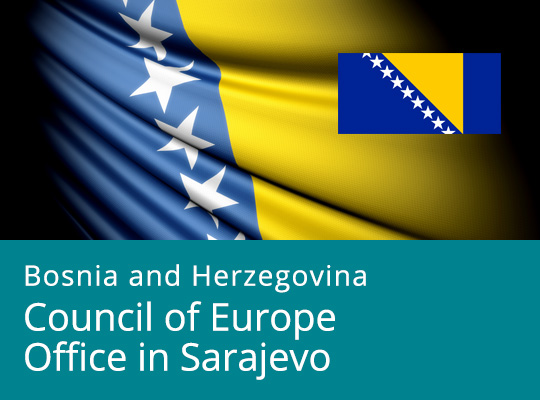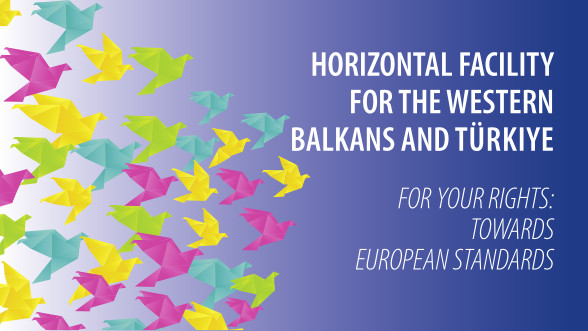Horizontal Facility for the Western Balkans and Türkiye” (Horizontal Facility III)
Professionals in Bosnia and Herzegovina adressed technology-facilitated trafficking in human beings as a growing problem in the country

The criminal landscape of trafficking in human beings has significantly changed with the increasing availability of technology and generalised access to the Internet. Countries monitored by GRETA (Council of Europe Group of Experts on Action against Trafficking in Human Beings) have reported increased use of technology for recruiting, exploiting and controlling victims of human trafficking, while evidence of such misuse of ICT remains limited.
To support institutions in Bosnia and Herzegovina in addressing the impact of technology on human trafficking, the Council of Europe anti-trafficking project organised the seminar "Online and technology-facilitated trafficking in human beings" on 25 March, in Sarajevo.
Forty professionals that included representatives from the Ministry of Internal Affairs, police agencies, prosecutor's offices, lawyers, labour inspectorates, as well as international organisations and non-governmental organisations were introduced to the GRETA report „Online and technology-facilitated trafficking in human beings“ by the author, Professor Paolo Campana from the University of Cambridge. The report provides analysis and guidance on how to enhance the criminal justice response by improving the detection, investigation and prosecution of ICT-facilitated trafficking in human beings. Mr Campana presented the conclusions and recommendations of the report in the light of the BiH context.
Furthermore, law enforcement representatives presented real-llfe cases in Bosnia and Herzegovina and discussed challenges in the identification and investigation of online trafficking in human beings. The participants empasized the importance of multi-sectoral cooperation and capacity-building of all relevant actors (police officers, prosecutors and judges). Enhanced cooperation with private companies and the non-governmental sector was considered as essential.
The Council of Europe project “Strengthening anti-trafficking action in Bosnia and Herzegovina” is implemented in the framework of the Council of Europe’s Action Plan for Bosnia and Herzegovina (2022–2025), funded by voluntary contributions.
What is the Horizontal Facility?
The joint European Union/Council of Europe programme “Horizontal Facility for the Western Balkans and Türkiye” (Horizontal Facility III) is a co-operation initiative and one of the results of the Statement of Intent signed on 1 April 2014 by the Secretary General of the Council of Europe and the European Union Commissioner for Enlargement and European Neighbourhood Policy, in which both Organisations agreed to further strengthen their co-operation in key areas of joint interest.
The programme is ongoing since 2016 and the third phase begun in January 2023 for a period of 48 months. The third phase of the programme (worth €41 million (85% funded by the EU, 15% by the CoE) keeps building on the results of the previous phases and it combines Beneficiary-specific and regional actions.
It enables the Beneficiaries to meet their reform agendas in the fields of human rights, rule of law and democracy and to comply with European standards, which is also a priority for the EU enlargement process.
Themes covered by the Horizontal Facility include:
- strengthening justice
- fighting corruption, economic crime and money laundering
- promoting anti-discrimination and protection of the rights of vulnerable groups (including LGBTI, minorities and Roma) and
- promoting and protecting freedom of expression and media
The Expertise Co-ordination Mechanism that provides legislative expertise and policy advice within the Council of Europe system remains also an important part of the programme available to all Beneficiaries.
The Horizontal Facility relies on the Council of Europe’s unique working methods, whereby tailor-made technical co-operation activities are based on conclusions and recommendations of the Council of Europe’s monitoring bodies highlight areas where improvements are needed in legislation and policies of the Beneficiaries to comply with the Organisation’s treaties and other standards.
Which Horizontal Facility actions are being implemented in Bosnia and Herzegovina?
In Bosnia and Herzegovina, the following actions are currently being implemented:
- Strengthening the efficiency and quality of justice in Bosnia and Herzegovina (BiHSEJ)
- Further strengthening the treatment of detained and sentenced persons in line with European standards in Bosnia and Herzegovina
- Action against corruption, money laundering and terrorist financing in Bosnia and Herzegovina
- Towards an equal, inclusive and tolerant Bosnia and Herzegovina
- Quality education for all – Bosnia and Herzegovina
- Protecting freedom of expression and of the media in Bosnia and Herzegovina (PRO-FREX-BH)




